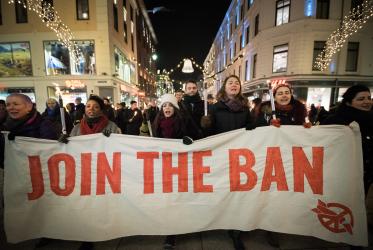Adebayo Anthony Kehinde leads an African group supporting ICAN, the International Campaign to Abolish Nuclear Weapons. Its interfaith campaign is especially significant on the 70th anniversary of the atomic bombings in Japan.
“The African partner members of ICAN have been very active and vocal in supporting the Ban on Nuclear Weapons and Small Arms Proliferation,” said Kehinde, a member of the World Council of Churches (WCC) Commission of the Churches on International Affairs (CCIA).
The group has made its voice heard in work spheres and at crucial inter-religious initiatives in this symbolic year, including an important interfaith meeting in London on 25 September.
Africa’s importance is underscored by the fact that South Africa, under the apartheid regime, was a nuclear arms power.
“This also underscores the importance we attached to the recently held interfaith meeting between the Youth Ministry of our Church and ICAN UK chapter to commemorate the 70th anniversary of Hiroshima,” said Kehinde.
The government of Nigeria, considered one of Africa’s economic centers, has long supported the ban on nuclear weapons.
“For 13 years, Nigeria has remained one of the foremost promoters of the African Nuclear-Weapon-Free Zone Treaty, also called the Pelindaba Treaty. It entered into force on 15t July, 2009,” said Nigeria’s Permanent Mission to the United Nations in New York.
South Africa’s nuclear arms programme ended it in 1989.Bombs were dismantled and South Africa acceded to the Treaty on the Non-Proliferation of Nuclear Weapons in 1991. In August 1994, after completing an inspection, the International Atomic Energy Agency confirmed South Africa’s nuclear weapons had been dismantled.
South African President Jacob Zuma observed at the United Nations (UN) on 29 September that 2015 marks not only 70 years since the formation of the UN, but also 70 years since the United States dropped atomic bombs the Japanese cities of Hiroshima and Nagasaki. “There can be no safe hands for nuclear weapons,” he declared. “The humanitarian consequences of a possible detonation of a nuclear weapon, whether intentionally or accidentally, will be catastrophic for humanity.”
As a global campaign coalition with ecumenical support, ICAN works to mobilize people in all countries to inspire, persuade and pressure their governments to initiate and support negotiations for a treaty banning nuclear weapons.
Church leaders to embark on pilgrimage to Hiroshima and Nagasaki seeking an end to nuclear threats (WCC press release of 27 July 2015)
WCC Pilgrimage of Justice and Peace
WCC project “Churches engaged for nuclear arms control”









